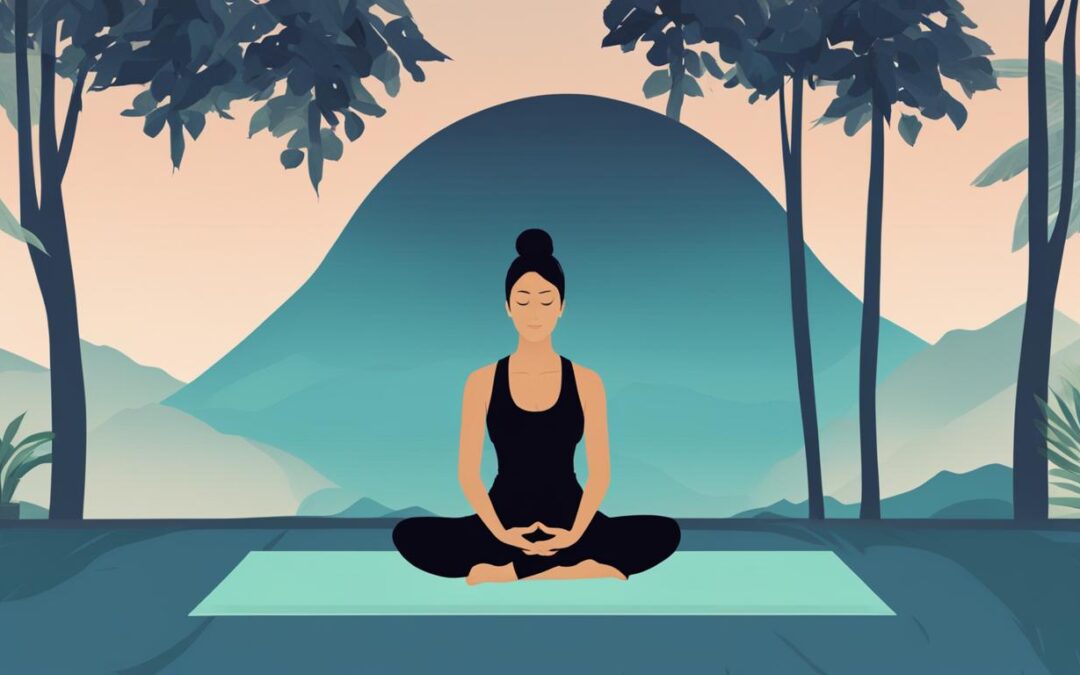In the stirring tale of a Buddhist master and an irate visitor, “Breath & Mind Connection: Unveiling Zen Wisdom Through a Buddhist Story” explores the profound link between our breathing patterns and mental states.
Through a vivid narrative, the story demonstrates how mastering one’s breath can lead to tranquility and wisdom, offering insights into Zen teachings on mindfulness and the transformative power of breath control.
This guide delves into the ancient wisdom and scientific evidence supporting the breath-mind connection, guiding readers on how to harness this relationship for a more serene and focused life.
✨Discover The Secret To Getting Exactly What You Want In Life: ➡️The Abundance Airway.
The Buddhist Tale of the Angry Man
Once upon a time, in a far-off land, a Buddhist master was confronted by an angry man. This man, seething with rage, was like a tempest, raging against the serenity of the master’s presence.
His breath was heavy, a stormy rhythm echoing the tumult within his mind. In stark contrast, the Buddhist master, a beacon of tranquility, stood unflinching in the face of the angry man’s storm.
His breath, steady and serene, was a testament to his inner calm, an oasis of peace amidst the chaos. The master, with his years of wisdom and understanding, looked at the angry man and saw not a foe, but an opportunity.
An opportunity to impart a lesson so profound, it could alter the course of the man’s life. He spoke in a calm, soothing voice, Observe your breath, my friend. It is as restless as a wild horse, mirroring the turmoil within your mind.
Your anger, your resentment, they are all manifested in your breath. The angry man, taken aback, paused to consider the master’s words. As he did, he noticed his erratic breathing, the rapid rise and fall of his chest, the sharp inhales and exhales.
It was indeed a reflection of his mental state, a mirror of his inner storm. The master continued, Now, try to calm your breath. Breathe in slowly, breathe out gently. Let your breath flow smoothly, like a gently flowing river.
As your breath calms, so too will your mind. The man followed the master’s advice, his breath gradually transforming from a violent storm to a gentle breeze.
With each slow, mindful breath, his anger began to subside, replaced by a sense of tranquility he had never experienced before. And so, the angry man learned that his breath was the mirror of his mind, reflecting his emotions and thoughts.
This tale, from a time long past, unfolds a timeless wisdom. It’s a reminder that our breath and mind are intertwined, and by calming one, we can calm the other.
The tale of the angry man is not just a story, it’s a lesson in mindfulness, a testament to the power of breath, and a glimpse into the profound wisdom of Zen.
So, what if I told you, you could instantly take control over an incredibly powerful, subconscious force, that’s right under your nose?
Curious?
✨Discover The Secret To Getting Exactly What You Want In Life: ➡️The Abundance Airway.
Unveiling the Breath & Mind Connection

Now, the Buddhist master’s wisdom in this tale unveils an important Zen teaching: the connection between our breath and our mind. This connection, while seemingly simple, is profound and deeply rooted in the philosophy of Eastern wisdom traditions.
Imagine for a moment, a calm lake, its surface smooth and unbroken. This is akin to the mind in a state of tranquility. Now, envision a pebble being thrown into the lake, disrupting its surface with ripples.
This disturbance is much like the thoughts and emotions that constantly stir our mind. But what’s the breath got to do with this?
Well, our breath is the pebble.
Our breath is a reflection of our mental state. When we’re stressed, our breathing becomes shallow and rapid. Conversely, when we’re at peace, our breath is deep and slow. By observing our breath, we can gauge our state of mind.
But the breath-mind connection doesn’t stop here. The beauty of this connection is that it’s bidirectional. Just as our mind influences our breath, our breath can influence our mind.
By controlling our breath, we can control our mind.
Breath control, or ‘Pranayama‘ as it’s known in Yogic tradition, is a powerful tool for mental equilibrium. When we consciously slow down our breath, we can calm our mind, reducing anxiety and stress.
But how do we gain this control over our breath, and thereby our mind? Here’s where the art of meditation comes in:
- Meditation is more than just a relaxation technique.
- It’s a practice that trains your mind to focus and redirect your thoughts.
During meditation, we focus on our breath, observing its rhythm, its depth, its pace. By becoming more aware of our breath, we become more aware of our mind’s workings.
Meditation, then, becomes a tool for mastering not just our breath, but our mind as well. So, the next time you find yourself in the throes of stress or anxiety:
- Remember the Zen master’s wisdom.
- Remember the connection between your breath and your mind.
- Harness it to find your inner peace.
✨Discover The Secret To Getting Exactly What You Want In Life: ➡️The Abundance Airway.
The Science of Breath & Mind Connection

Beyond the world of Zen wisdom, modern science also supports the connection between our breath and our mind.
It’s a fascinating relationship, one that offers us a deeper understanding of our own physiology and mental processes.
Let’s take a journey into the realm of scientific studies that reinforce these ancient Buddhist teachings. Picture this – every time we breathe in and out, we’re not just exchanging oxygen and carbon dioxide.
We’re also influencing our heart rate, our stress levels, and our mental clarity.
In a study published in the Journal of Neurophysiology, researchers discovered that controlled breathing, the type often used in meditation and yoga, directly affects the levels of a natural chemical messenger in the brain called noradrenaline.
This chemical is released when we are challenged, curious, focused, or emotionally aroused. If produced at the right levels, it helps the brain grow new connections, like a fertile soil nurturing seeds into sprouts.
It doesn’t stop there.
Further research shows that deep, slow breathing can also reduce anxiety and increase our attention span.
A study published in the Journal of Clinical Psychology found that participants who practiced controlled breathing over an eight-week period showed significantly lower levels of anxiety and had improved focus compared to those who did not.
Now, consider the benefits of controlled breathing. Reduced anxiety, improved focus, and enhanced mental clarity – these aren’t just abstract concepts, but tangible benefits that can truly transform our daily experiences.
The beauty of it all?
The power to tap into these benefits lies within us – in every inhale and exhale. It’s a testament to the remarkable capabilities of the human body and mind, a convergence of science and ancient wisdom.
So, as we delve into the science of the breath and mind connection, we find that our breath is more than a silent spectator in our lives. It’s an active participant, a maestro if you will, orchestrating our mental and emotional states.
Science and ancient wisdom converge, affirming that the rhythm of our breath indeed orchestrates the song of our mind.
✨Discover The Secret To Getting Exactly What You Want In Life: ➡️The Abundance Airway.
Harnessing the Breath & Mind Connection

Now that we understand the connection between our breath and our mind, how can we harness this knowledge? Indeed, the journey to mastering the breath and mind connection may seem daunting, but it begins with simple, daily practices.
Start by dedicating a few quiet moments each day to focus on your breath. Inhale deeply, hold for a moment, then exhale slowly. Feel your lungs expand and contract, and let your awareness reside there.
Remember, consistency is key. This isn’t a race:
- It’s a lifelong journey of self-awareness and mindfulness.
Some days, your mind may wander. That’s okay. Gently guide it back to your breath. Also, be patient with yourself. Meditation is not about perfection.
It’s about creating a space where you can connect with your inner self, away from the hustle and bustle of the world. By mastering our breath, we can indeed master our mind, and live a more peaceful, mindful life.
Remember, the breath is the bridge between the mind and body, a bridge you can cross at any time.
So, are you ready to transform your life and reach levels of success and happiness that you never dreamed possible?
✨Discover The Secret To Getting Exactly What You Want In Life: ➡️The Abundance Airway.
FAQs for “Breath & Mind Connection: Unveiling Zen Wisdom Through a Buddhist Story”
1. What is the “Breath & Mind Connection”? The “Breath & Mind Connection” refers to the intimate link between our breathing patterns and our mental states. This concept suggests that by managing our breath, we can influence our emotions, calm our mind, and achieve greater mindfulness and tranquility.
2. How does the Buddhist story relate to mindfulness? The Buddhist story illustrates the principle of mindfulness through the interaction between a Buddhist master and an angry man. It highlights how awareness and control of one’s breath can reflect and regulate one’s emotions, serving as a practical demonstration of mindfulness in action.
3. Can anyone practice breath-focused meditation? Yes, breath-focused meditation is a universally accessible practice. It doesn’t require special equipment or a specific location. With guidance and consistent practice, anyone can learn to use their breath as a tool for calming the mind and enhancing mindfulness.
4. What are the benefits of understanding the Breath & Mind Connection? Understanding and practicing the Breath & Mind Connection can lead to numerous benefits, including reduced stress and anxiety, improved concentration and focus, enhanced emotional regulation, and a deeper sense of peace and well-being.
5. Do I need to have experience in meditation to benefit from these teachings? No, beginners and experienced meditators alike can benefit from these teachings. The story and the principles it conveys are presented in a way that is accessible and meaningful to individuals at all levels of meditation practice.
6. How long does it take to see results from practicing breath control and mindfulness? The timeline for experiencing results can vary widely among individuals. Some may notice changes immediately, while for others, it may take weeks or months of consistent practice. The key is regular, mindful practice and patience.
7. Is there scientific evidence supporting the Breath & Mind Connection? Yes, there is growing scientific evidence that supports the connection between breath control and mental well-being. Studies have shown that practices like controlled breathing can have a positive impact on stress levels, mental health, and even cognitive performance.
8. Can this practice help with anxiety or depression? Breath-focused practices and mindfulness meditation have been used as complementary approaches to managing anxiety and depression. They can help by promoting relaxation, reducing stress, and fostering a greater awareness of one’s thoughts and emotions.
9. How often should I practice breath-focused meditation? For best results, aim to practice breath-focused meditation daily. Even a few minutes a day can be beneficial, especially when starting out. Over time, you may find that you can comfortably extend the duration of your practice.
10. Where can I learn more about Zen teachings and meditation practices? There are many resources available for those interested in exploring Zen teachings and meditation practices further, including books, online courses, and workshops offered by meditation centers or Zen communities. It’s also beneficial to seek out a qualified teacher or mentor for guidance.
✨Discover The Secret To Getting Exactly What You Want In Life: ➡️The Abundance Airway.
Source Links









